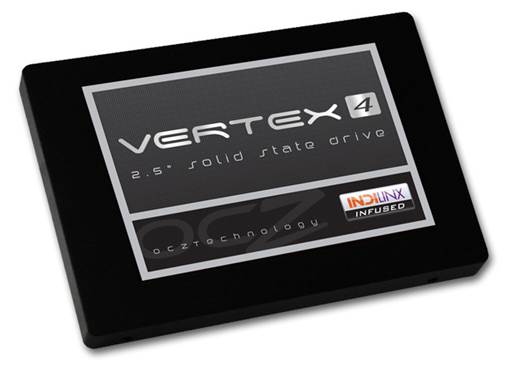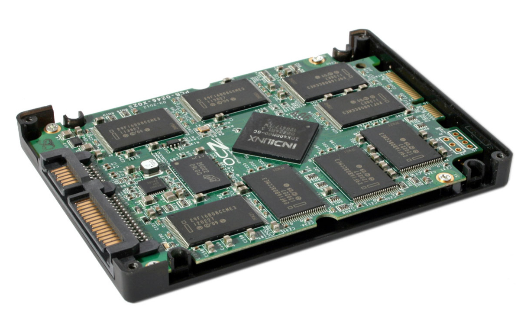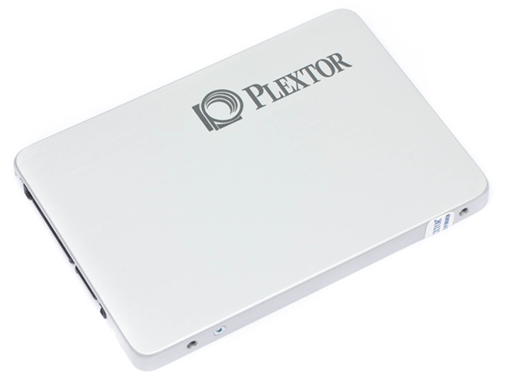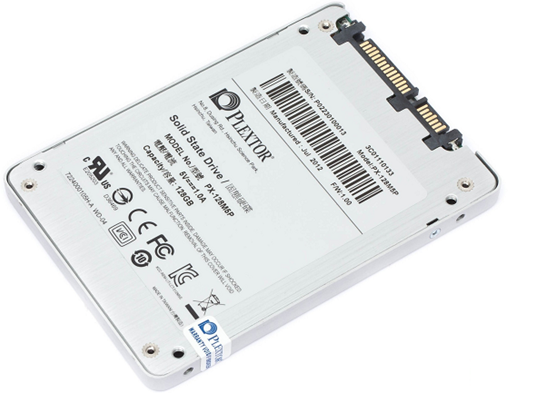Vital statistics
·
Price: $246.4
·
Manufacturer: OCZ
·
Web: www.ocztechnology.com
·
Capacity: 256GB
·
Memory type: MLC synchronous
·
Controller: Indilinx Everest 2
·
Interface: SATA 6Gbps
·
Peak performance: 560MB/sread, 510MB/s write
·
Max lOPS: 95k

OCZ
Vertex 4 256GB
We remember the days, when drives had
valves and pistons, and turny-turny things, and speediness generally meant
flakiness. In this brave new age of solid-state computing, the idea is that the
absence of moving parts means there's no downside to cranking up the clocks and
letting things loose.
So far, however, that hasn't fully applied
to solid-state drives. In fact, the sheer scale of vagaries that apply to
solid-state storage continues to bemuse us. It makes getting consistent results
from comparative benchmarks a bit of a'mare. Enter the OCZ Vertex 4, a
super-speedy SSD with a rep for falling over.
Now, there's an awful lot we like about this
drive. For starters, we like the fact that OCZ has its own controller chip and
firmware. Well, that's not quite true as our understanding is that the Vertex
4's Indilinx Everest 2 controller is a rebadged Marvell chip. But by several
metrics, the firmware is every bit as important and that's definitely OCZ
Indilinx.
We also like the fact that OCZ has gone to
town on I0P5 performance with the Indilinx 2 controller in general and the
Vertex 4 in particular. It’s rated at 95,000 maximum read IOPS, which makes it
more or less first equal with Samsung's fancy new 840 Pro, a drive that costs
over $78 more.
What's more, unlike drives based on the
SandForce controller, the Vertex 4 doesn't rely on in-drive data compression to
achieve big performance numbers. Along with the impressive claims for IOPS
performance, that bodes well for real-world performance, which tends to either
involve lots of little data transfers or shunting around large, incompressible
files like music, images and video.
All fall down
What we haven't been so impressed with, so
far at least, is the Vertex 4's reliability. We've first-hand experience of
Vertex 4 drives losing the will to live. Okay, our experience is anecdotal - we
haven't run 1,000 sample drives as part of a peer-reviewed research paper, and
it's worth remembering that you get a full five-year warranty -but when you
know drives are going pop, it's hard to ignore.
Still, you can say the same of the Vertex
4's performance. It's too good to ignore. It blitzes the majority of the
benchmarks we care most about. It clocks up easily the fastest 4k random write
rate of 71.9MES/s, for instance.
Even more important are real world
applications, such as file decompression and game installation. And guess what?

OCZ
Vertex 4 256GB
It posts the two fastest times there. But
in the context of our reliability concerns, perhaps the most reassuring result
comes in the endurance test. Where other drives lose performance in some areas
following repeated cycles of filling with data and deleting, the Vertex 4
barely bats a flash memory chip. It still hits 70MB/s in the 4k random write
benchmark. Impressive.
For a top performing SSD, it's also sharply
priced. It certainly makes Samsung's new 840 Pro look rather silly. It's super
quick, probably the quickest SSD you can buy. But evidence of flakiness makes
it awfully hard to recommend. On balance, we’d take the chance, but you might
take a different view.
Plextor M5 Pro 128GB
Vital statistics
·
Price: $204.8
·
Manufacturer: Plextor
·
Web: www.plextor-digital.com
·
Capacity: 128GB
·
Memory type: MLC toggle
·
Controller: Marvell 88S59187
·
Interface: SATA 6Gbps
·
Peak performance: 540MB/sread, 340MB/s write
·
Max lOPS: 91k

Plextor
M5 Pro 128GB
Controller chips for SSDs are very tough to
get right. So tough, in fact, that Intel was forced to buy in third party chips
to keep its consumer SSDs in the game. What hope, therefore, for a relatively
small player like Plextor?
Plenty, actually. For starters, the odd
truth is that several of the leading SSD controller chipsets hail from pretty
puny outfits. Brands like SandForce and Indilinx are not the brainchildren of
mighty global outfits.
What's more, firmware for controller
chipsets is every bit as important as the hardware itself. And it just so happens
that Plextor has a track record for knocking out some nifty firmware. The old
Plextor M3 Pro was among the best SSDs to use the Marvell 88SS9174 controller,
for instance.
But now Marvell has a new controller, the
88SS9187, and it's time to find out whether Plextor has managed to work a
little magic once again. There's certainly plenty to like on paper. Along with
the new Marvell controller and the promise of something special from Plextor's
firmware team, the M5 Pro also gets the very latest 19nm toggle NAND from
Toshiba. Right now, flash memory doesn't get much finer than that.
The net result is a set of impressive
specifications. Claimed IOPS for both 4k random reads and writes, for instance,
aren't a million miles away from 100k each, which puts the M5 Pro up there with
the best. If there is a weakness with this 128GB model, it's sequential writes.
At 340MB/s they're good, but not great.
That's a common problem with smaller
drives, of course. With just a single flash chip per memory channel, latency
becomes a problem. Larger drives that put two or more flash chips on the end of
each channel tend to keep things motoring more efficiently.
Solid backing
Still, this is a quality overall package
with a claimed minimum mean time before failure of 2.4 million hours.
If you're not totally convinced such
numbers reflect real-world robustness, and we're with you on that, you can’t
argue with the five-year warranty. Plextor clearly backs this drive.

Plextor
M5 Pro 128GB
But we can't quite do the same. The problem
is a combination of mediocre performance and punitive pricing. Just a few
months ago, the M5 Pro's 4k random read and write performance would have been
peachy. But the likes of Samsungand OCZ have since changed the game.
The result is a drive with no major
weakness, but not enough chutzpah to stand out from the crowd. It zips through
our file decompression benchmark in 33 seconds, for instance. That's about
twice as quick as one of Intel's X25-Ms from the early days of SSDs can manage.
But the best drives here do the same job in just 26 seconds.
The M5 Pro's performance in our endurance
testing was a little disappointing too; 4K random write performance fell off
from 52.8MB/s to 45MB/s. Hardly catastrophic, but there are drives that
suffered very little fall off, and are faster to begin with. Then there's the
fact that you'll have to fork out $204.8 for a 128GB drive. KingSpec's 1TB card
aside, that makes it the priciest here in terms of GB per pound.